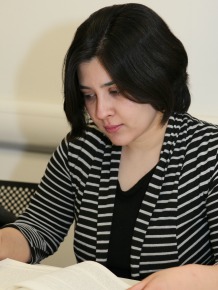Psycholinguistic approaches to second language acquisition
Aims
Aims
Psycholinguistic research into second language acquisition asks questions about how a second language is processed, in terms of comprehension and production, and in terms of both spoken and written language. Of key interest are questions about the roles played by a speaker’s first language, by working memory, and—in the context of classroom-based learning— by language instruction, in second language production/comprehension. This module will:
- introduce psycholinguistic approaches to the study of second language acquisition through reading and discussion of primary research articles. ‘Second language acquisition’ will be understood in its broadest sense, so readings may cover simultaneous bilingualism, sequential bilingualism, and multilingualism;
- familiarize students with a variety of psycholinguistic research methods used to study second language acquisition, including self-paced listening/reading, cross-modal priming, and eye-tracking. A range of aspects of second language knowledge will be covered, including at least three of syntax, semantics, phonology, speech perception, vocabulary, literacy;
- develop students’ understanding of the key elements of good research design and informative presentation of results, including reporting of statistics, within psycholinguistic research.
Prerequisites
Prerequisites
-
Language acquisition
-
Psycholinguistics
Programme
Programme
Contact hours
There are two contact hours per week.
Teaching programme
This module is reading-based. Learning centres around close reading and discussion of around 10 assigned research articles, with further research by students to identify additional reading resources for the module assessments. Guidance on how to read the research articles will be given throughout the module, and active engagement with the reading will be essential. Students will need to read the papers in advance of the seminars, bring questions to seminars, collaborate with peers on presentations of the article content, and be ready to think beyond the content of the assigned papers and to make links between the different studies and further studies that students will identify according to their own interests within the module content.
By the end of the course, students should be able to:
- understand key questions that motivate psycholinguistic research into second language acquisition;
- explain a variety of psycholinguistic research techniques, including knowing which techniques are appropriate to what kind of research question;
- understand the reporting of results, including statistical data, in a psycholinguistic study and be able to evaluate the effectiveness of different ways of presenting results;
- write a proposal for a psycholinguistic investigation of second language acquisition.
Teaching materials
A set of primary research papers will be assigned.
In addition, the following textbook is recommended:
Jegerski, J., & VanPatten, B. (eds.). 2014. Research Methods in Second Language Psycholinguistics. New York/Abingdon: Routledge.
Suggestions for reading before the module starts
1. As a general introduction to the topic:
VanPatten, B. 2014. The psycholinguistics of SLA. Chapter 1 in J. Jegerski and B. VanPatten (eds.) Research Methods in Second Language Psycholinguistics. New York/Abingdon: Routledge. pp. 1-19.
2. To prepare for reading the statistical reporting in the assigned papers:
Brown, J.D. 1991. Statistics as a Foreign Language - Part 1: What to Look for in Reading Statistical Language Studies. Tesol Quarterly 25: 569-586
Brown, J.D. 1992. Statistics as a Foreign Language - Part 2: More Things to Consider in Reading Statistical Language Studies. Tesol Quarterly 26: 629-664.
Assessment
Assessment
Formative work
- Dossier of exercises.
- Preparation for seminar participation and for seminar presentations is also important formative work on this module.
Summative assessment
- 5,000 word essay.

About this module
- Module name
Psycholinguistic approaches to second language acquisition- Course code
L72M (LAN00072M)- Teacher
Heather Marsden- Term(s) taught
Spring- Credits
20
